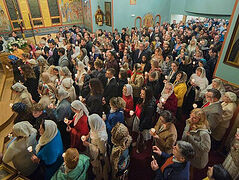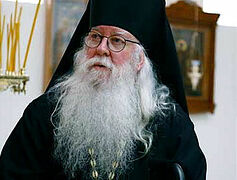Elections and political campaigns in America seem to rouse many sinful passions in Americans, even in Christians. Some may feel it is good to be passionate about one’s convictions. Yet passions can ruin prayer as they often make our will more important than God’s. We end up not seeking God’s will and blessings but expecting God to conform to our personal political ideology (because many mistakenly assume God must be on their side). Wisdom reminds us that the strength of our convictions does not guarantee the righteousness of our cause.
In yesterday’s post, Praying for a President, I mention words from the monk Isaac whom St John Cassian quotes about prayer. As it turns out praying for the president or praying during a contentious election is no different than proper daily prayer for Christians. Though our passions might be much stronger about the president or congress (or because of the election), it is not the passions that should be governing our prayer life. The Blessed Isaac tells us about prayer at any time, which we have to apply to ourselves during a political campaign or when we think about our government.
“Prayer, if it is to be fervent and pure, demands that the following be observed:
First, there must be a complete removal of all concern for bodily things. Then not just the worry but even the memory of any business or worldly affair must be banished from within ourselves. Calumny, empty talk, nattering, low-grade clowning – suchlike must be cut out. Anger and the disturbance caused by gloominess are especially to be eradicated. The poisonous tinder of carnal desire and avarice must be pulled out by the roots.
Maybe someone will dismiss Isaac’s words saying this is just how a monk sees things, but his words are meant for all Christians. He is advising us how to put our heart and mind in the proper condition for prayer. Some of the things he mentions certainly would mean that we have to stop listening to political talk show people and also to negative political advertising (As the monk Isaac says we need to cut out “Calumny, empty talk, nattering, low-grade clowning” and the like. If we really desire to eliminate those vices from our lives then we will never listen to opinionated political talk show hosts again because that is a lot of what they say.) Anger and despair are hindrances to proper prayer, so if listening to political talks makes us angry or despondent, then we should stop listening to them so that we can clear our heart and mind and focus on God, God’s love and God’s will. Praying for our political leaders or political candidates starts with our own effort to have a pure heart free of passions. That isn’t just important during an election year, that is a prerequisite for prayer anytime of year.
Having completely expelled and sliced away these and similar vices which are so manifest to the human eye, having, as I have said, undertaken this clearing away which results in purity and in the simplicity of innocence, we have then to lay the indestructible foundations of deep humility, foundations which can support that tower rising upward to the skies Next comes the spiritual edifice of virtue. After that, the soul must be restrained from all meandering, from all slippery wanderings, so that it may rise bit by bit to the contemplation of God and to the gazing upon the realms of the spirit.
The goal of prayer is communion with the Lord God. That is just as true of prayers for civil authority or prayers during an election. We want to be in Communion with God and we should pray that same ideal for our political leaders and candidates. Praying for them doesn’t mean we agree with them or imagine that they are without fault or failure. We are praying that they might change their own hearts and minds enough to be in communion with the Living God or at least open to experiencing the sense of God’s presence in their lives. Our effort requires some concentration and focus – on God. We aren’t praying “my will be done” but that God’s will be done. For some there will be the shock that the ideas and ideology they hold to may in fact not be God’s will at all. “For my thoughts are not your thoughts, nor are your ways my ways, says the Lord” (Isaiah 55:8).
Because of the workings of memory whatever has preoccupied our mind before the time for prayer must of necessity intrude on our actual prayers. Therefore in advance of prayer we must strive to dispose ourselves as we would wish to be during prayer. The praying spirit is shaped by its own earlier condition. As we prostrate ourselves for prayer for our deeds, words, and fastings rise up in our imagination. They are as they were before our prayer, and they move us to anger or gloom. We turn back toward desire or worldly affairs. Stupidly – and I am ashamed to say it – we laugh as we recall some clownish word or act, and the mind flits back to the earlier concerns of our talk.
Isaac is advocating that before you pray for some thing which is important to you, prepare yourself by prayer to free your heart and mind of your passions, worries, prejudices, fears and all the jumble of thoughts which were occupying your mind and causing you to be passionate, angry and upset. Take time to ask God to clear your heart and mind before you begin to pray for anything else. If you want to pray in earnest, then set your heart right before God.
So therefore before we pray we must hasten to drive from our heart’s sanctuary anything we would not wish to intrude on our prayers, and all this so that we might do as the apostle bids us: ‘Pray ceaselessly‘ (1 Thess 5:17). ‘In every place lift up pure hands, with no anger and no rivalry‘ (1 Tim 2:8). But we will not be able to fulfill this injunction unless the mind within us is cleansed of the contagion of sin, is devoted to virtue as its natural good, and feeds continuously on the contemplation of the all-powerful God.” (Blessed Isaac, quoted in St John Cassian’s CONFERENCES, pp 102-103)
Let all that you do be done in love (1 Corinthians 16:14). That is first and foremost in our prayers. It should not be hatred that inspires you to pray, nor anger, nor fear, nor any passion, except love for God and love for neighbor. Prayer should result in your own union with God, and should be hoping that those you are praying about may also be united to Christ.




